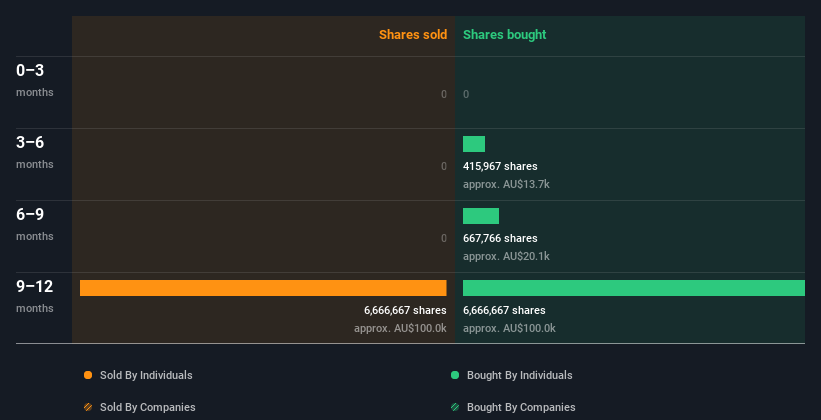Great news for Registry Direct Limited (ASX:RD1): Insiders acquired stock in large numbers last year
When a single insider purchases stock, it is typically not a major deal. However, when multiple insiders purchase stock, like in Registry Direct Limited's (ASX:RD1) instance, it's good news for shareholders.
Although we don't think shareholders should simply follow insider transactions, logic dictates you should pay some attention to whether insiders are buying or selling shares.
View our latest analysis for Registry Direct
Registry Direct Insider Transactions Over The Last Year
The Company Secretary Ian Roe made the biggest insider purchase in the last 12 months. That single transaction was for AU$100k worth of shares at a price of AU$0.015 each. That means that an insider was happy to buy shares at around the current price of AU$0.016. Of course they may have changed their mind. But this suggests they are optimistic. If someone buys shares at well below current prices, it's a good sign on balance, but keep in mind they may no longer see value. The good news for Registry Direct share holders is that insiders were buying at near the current price. We note that Ian Roe was both the biggest buyer and the biggest seller.
In the last twelve months insiders purchased 7.75m shares for AU$138k. But insiders sold 6.67m shares worth AU$100k. In total, Registry Direct insiders bought more than they sold over the last year. Their average price was about AU$0.018. This is nice to see since it implies that insiders might see value around current prices. You can see a visual depiction of insider transactions (by companies and individuals) over the last 12 months, below. By clicking on the graph below, you can see the precise details of each insider transaction!
Registry Direct is not the only stock insiders are buying. So take a peek at this free list of growing companies with insider buying.
Insider Ownership
I like to look at how many shares insiders own in a company, to help inform my view of how aligned they are with insiders. A high insider ownership often makes company leadership more mindful of shareholder interests. Registry Direct insiders own about AU$3.0m worth of shares (which is 44% of the company). This kind of significant ownership by insiders does generally increase the chance that the company is run in the interest of all shareholders.
So What Do The Registry Direct Insider Transactions Indicate?
There haven't been any insider transactions in the last three months -- that doesn't mean much. On a brighter note, the transactions over the last year are encouraging. It would be great to see more insider buying, but overall it seems like Registry Direct insiders are reasonably well aligned (owning significant chunk of the company's shares) and optimistic for the future. In addition to knowing about insider transactions going on, it's beneficial to identify the risks facing Registry Direct. Case in point: We've spotted 4 warning signs for Registry Direct you should be aware of, and 3 of these are a bit concerning.
Of course, you might find a fantastic investment by looking elsewhere. So take a peek at this free list of interesting companies.
For the purposes of this article, insiders are those individuals who report their transactions to the relevant regulatory body. We currently account for open market transactions and private dispositions, but not derivative transactions.
Have feedback on this article? Concerned about the content? Get in touch with us directly. Alternatively, email editorial-team (at) simplywallst.com.
This article by Simply Wall St is general in nature. We provide commentary based on historical data and analyst forecasts only using an unbiased methodology and our articles are not intended to be financial advice. It does not constitute a recommendation to buy or sell any stock, and does not take account of your objectives, or your financial situation. We aim to bring you long-term focused analysis driven by fundamental data. Note that our analysis may not factor in the latest price-sensitive company announcements or qualitative material. Simply Wall St has no position in any stocks mentioned.

 Yahoo Finance
Yahoo Finance 
